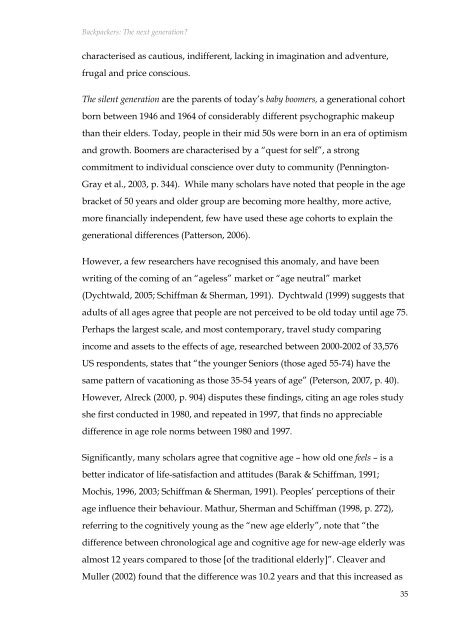Backpackers: The next generation? - Scholarly Commons Home
Backpackers: The next generation? - Scholarly Commons Home
Backpackers: The next generation? - Scholarly Commons Home
You also want an ePaper? Increase the reach of your titles
YUMPU automatically turns print PDFs into web optimized ePapers that Google loves.
<strong>Backpackers</strong>: <strong>The</strong> <strong>next</strong> <strong>generation</strong>?<br />
characterised as cautious, indifferent, lacking in imagination and adventure,<br />
frugal and price conscious.<br />
<strong>The</strong> silent <strong>generation</strong> are the parents of today’s baby boomers, a <strong>generation</strong>al cohort<br />
born between 1946 and 1964 of considerably different psychographic makeup<br />
than their elders. Today, people in their mid 50s were born in an era of optimism<br />
and growth. Boomers are characterised by a “quest for self”, a strong<br />
commitment to individual conscience over duty to community (Pennington-<br />
Gray et al., 2003, p. 344). While many scholars have noted that people in the age<br />
bracket of 50 years and older group are becoming more healthy, more active,<br />
more financially independent, few have used these age cohorts to explain the<br />
<strong>generation</strong>al differences (Patterson, 2006).<br />
However, a few researchers have recognised this anomaly, and have been<br />
writing of the coming of an “ageless” market or “age neutral” market<br />
(Dychtwald, 2005; Schiffman & Sherman, 1991). Dychtwald (1999) suggests that<br />
adults of all ages agree that people are not perceived to be old today until age 75.<br />
Perhaps the largest scale, and most contemporary, travel study comparing<br />
income and assets to the effects of age, researched between 2000-2002 of 33,576<br />
US respondents, states that “the younger Seniors (those aged 55-74) have the<br />
same pattern of vacationing as those 35-54 years of age” (Peterson, 2007, p. 40).<br />
However, Alreck (2000, p. 904) disputes these findings, citing an age roles study<br />
she first conducted in 1980, and repeated in 1997, that finds no appreciable<br />
difference in age role norms between 1980 and 1997.<br />
Significantly, many scholars agree that cognitive age – how old one feels – is a<br />
better indicator of life-satisfaction and attitudes (Barak & Schiffman, 1991;<br />
Mochis, 1996, 2003; Schiffman & Sherman, 1991). Peoples’ perceptions of their<br />
age influence their behaviour. Mathur, Sherman and Schiffman (1998, p. 272),<br />
referring to the cognitively young as the “new age elderly”, note that “the<br />
difference between chronological age and cognitive age for new-age elderly was<br />
almost 12 years compared to those [of the traditional elderly]”. Cleaver and<br />
Muller (2002) found that the difference was 10.2 years and that this increased as<br />
35

















